U.S. Military Intervention In Libya? Just Say No
Intervening to "help" the Libyan revolt is very tempting, but it's a temptation we ought to resist.
As the conflict in Libya continues to rage, the calls for U.S. military intervention are picking up steam. Today, for example, Senator John McCain expanded on comments he made while in Egypt over the weekend and called for a no-fly zone over Libya:
In some of his harshest comments so far, Senator John McCain (R-Ariz.) criticized the Obama administration Tuesday for its handling of tumultuous situations in Libya, Egypt and the Middle East.
McCain also shot down the argument that the U.S. could not afford to impose a no-fly zone over Libya.
“Of course we have to have a no-fly zone,” McCain said at an event hosted by the Atlantic Council in Washington on Tuesday. “We are spending over $500 billion dollars, not counting Iraq and Afghanistan, on our nation’s defense. Don’t tell me we can’t do a no-fly zone over Tripoli.”
“I love the military, I love it, it’s been my life, but they always seem to find reasons why you can’t do something rather than why you can,” he added.
McCain’s comments come on the same morning that the Washington Post reports that some rebel forces in Libya are considering whether to ask for outside military intervention:
Rebel leaders in eastern Libya called Tuesday for international military intervention to help topple Moammar Gaddafi, as the realization dawned that people power alone may not be enough to dislodge their nation’s autocratic leader from his last remaining strongholds.
The rebels said they do not want ground forces, but they are increasingly coming around to the view that help in the form of a no-fly zone, as well as airstrikes and supplies of weaponry, will be necessary to ensure Gaddafi’s fall.
U.S. military officials said the rebels have not yet asked them for help, and on Tuesday they played down the likelihood of the United States setting up a no-fly zone.
But in the eastern city of Benghazi, the center of the resistance, some members of the committee formed to run the city said they expected to issue a formal request for military assistance to the international community Wednesday.
And in Misurata, a town about 120 miles east of Tripoli that is besieged by Gaddafi’s militias, a spokesman for the newly formed committees set up to run that town said residents also want foreign help against Gaddafi.
“A no-fly zone would limit his movements, his ability to move mercenaries from south to north and to recruit mercenaries from sub-Saharan Africa,” said a member of the media committee, Saadoun, who requested that he be identified only by a nom de guerre because Misurata remains hotly contested.
“Providing military equipment and arms to our free army in the east will help the free army march to Tripoli,” said Saadoun in a telephone interview. “And we want surgical military strikes to target his militia and make this end swiftly and quickly and not to shed any more innocent Libyan blood.”
The temptation to intervene is understandable from a humanitarian point of view, especially as we see yet more reports today of the Libyan Air Force being used to strike towns controlled by the rebels, The idea of using American assets, probably assisted by NATO, to prevent the Libyans from using air power to attack civilians seems an easy call, but it becomes a little more complicated once you recognize that doing so means that we’d be taking sides in a civil war whose end is far from certain. Moreover, it ought to be recognized that a no-fly zone would be, without question, an act of war and would carry with it risks of any other military operation:
One Western diplomat, leaving a Security Council meeting on Wednesday, said that a no-fly zone over Libya would be “extremely difficult to implement — you need airports, hundreds of planes. It is an act of war, and you have to bear the consequences.”
Such a move could risk the ire of Libya’s Muslim and Arab neighbors and inflame already prickly relations with Security Council members Russia and China, experts say. Worse, such a provocative move could be perceived by Gadhafi’s regime as a declaration of war.
“The worst-case scenario may not be horrible, but we have seen that the costs of perceived military unilateralism in the Arab world are high,” said Michael O’Hanlon, a senior fellow at the Brookings Institution who specializes in national security and defense issues.
While the U.S. response has been diplomatic so far, a no-fly zone could cause things to escalate in a hurry: After the first Gulf War, the United States, with U.N. support, established a no-fly zone over southern Iraq in 1992 after reports that Saddam Hussein had used violence against Iraqis, specifically Kurds and Shiites. In the following years, Hussein’s air forces openly challenged the zone, resulting in skirmishes and an air of brinkmanship that didn’t end, fully, until 2003’s Operation Iraqi Freedom.
And without the ground support that coalition forces had in the Gulf War, foreign policy experts are split on how effective a no-fly zone would be.
But one thing they all agree on: A no-fly zone could touch off a wider conflagration.
“There would be happiness by some that the U.S. and Europe are standing by them,” said Steve Clemons, director of the American Strategy Program of the New America Foundation. “But a lot more will be skeptical. There is an institutional skepticism by anything from the West. Some will resent the perception of force robbing the Libyans of their own moment,” he said.
Moreover, the logistics of a no-fly zone over Libya would be difficult even with carrier-based aircraft. The Iraqi no-fly zones required about 200 U.S. and British planes to enforce, over an area far smaller than the land mass of Libya, and that was with bases located relatively close by in Kuwait (for the Southern no-fly) and Turkey (for the Northern no-fly). The logistics involved in a Libyan no-fly zone would be more complicated and, while not impossible, would likely involve more risk of loss in order to enforce. Additionally, as I’ve noted several times, a no-fly zone does nothing to stop ground based attacks by Libyan forces against civilians and rebels, which means that the pressure to expand our mission from enforcing a no-fly zone to actively attacking Libyan ground forces.
National Review made the case against intervention of any kind, even a no-fly, quite well earlier this week:
One, Qaddafi’s regime doesn’t appear to be doing much of its murder from the air. If we are serious about limiting his ability to massacre his countrymen, the no-fly zone would have to become a no machine-gun zone, too — in other words an honest-to-goodness military intervention to affect events directly on the ground. Deploying our air power while Qaddafi continued to kill with impunity would make us look more ineffectual rather than less. For now (perhaps this will change if Qaddafi begins to consolidate his position on the strength of his air force), the no-fly zone seems a classic case of looking for lost keys under the streetlight; it’s the handiest way for us to intervene, not the most effective.
Two, the rebels are on the ascendancy. Absent some drastic change in the tide of events, it looks as if they will prevail. Why would we taint what would be the indigenous glory of their ouster of Qaddafi with an almost entirely symbolic Western military action? The reason that the revolts of 2011 have had a dramatic catalyzing effect across the region, when the invasion of Iraq didn’t, is that they are the handiwork of Middle Eastern populations themselves, and thus a much more appealing model of change.
There would be no more effective way to bring an end to a Pan-Arab reform movement than to taint it as a tool of American “imperialism.” That argument is unlikely to work in Libya at this late date, but there are other nations watching and they’ll respond to what we do in Libya accordingly The best thing we can do right now is stay on the sidelines, provide humanitarian food and medical aid to refugees, and let the Libyans take control of their own future.
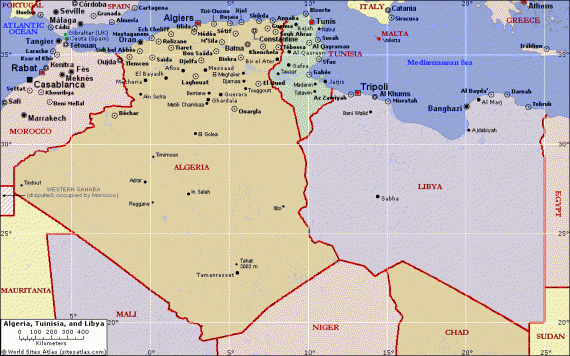

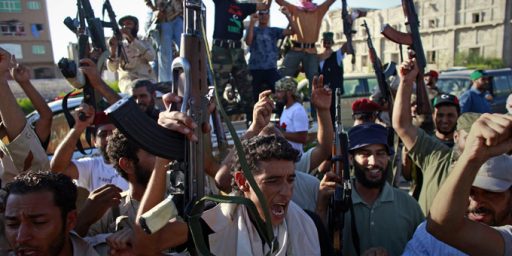
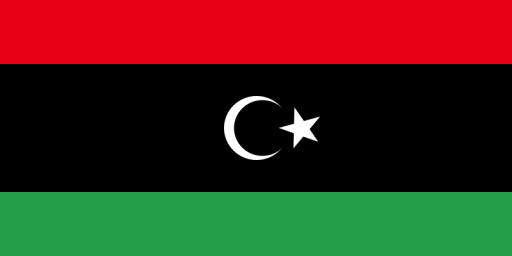
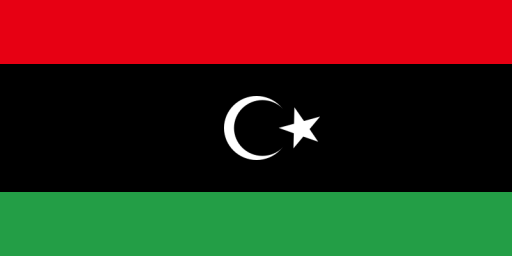

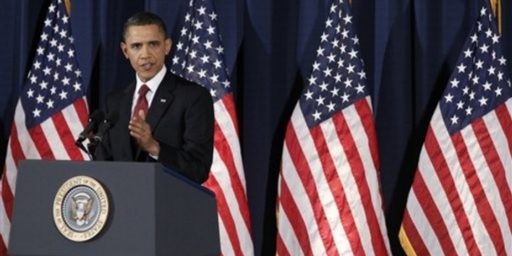
Wasn’t the U.S. accused of doing nothing while Saddam slaughtered the Shiites during the no-fly zone period?
Its funny how actually being the one who has to do something gives a different perspective from just talking about how someone else should do it. Mccain’s quote sounds strangely reminiscent of what Rumsfeld said at the of the Iraq invasion, when the Pentagon (correctly it appears in hindsight) wanted more soldiers for stabilizing the country than Rumsfeld thought was necessary.
Sure, you would say that, Doug. Way to stand athwart our American dreams of re-establishing the Ottoman Empire with our President as Sultan. We could have all of North Africa east of Algeria sewed up, and send out tendrils of destabilization from occupied Iraq in all directions until the middle east is ours, ours, ours!
Joking aside, your last sentence should be the hallmark of our foreign policy with respect to these hopeful revolutions. Are you listening, State Department?
No for USA intervention in Lybia.
from all Lybian people
I have to agree with your analysis, a military intervention would probably fuel radicalism and accustations against Western imperialism more than it would help the rebels. Also, if there is this much hesitancy to begin with, any operation, even if decided, would probably be carried out sloppily as well. Like you said, this would probably lead to a greater commitment, due to barely improving conditions on the ground. Reminds me a lot of how the conflict in Afghanistan evolved over time. So yeah, the West should stay out.
I do have to say though, the West should, in the future, maybe also refrain from plediging itself to doctrines like the “responsibility to protect” which was hailed at the UN Summit in 2005. Sure, states should be seen to have forfeited sovereignty if they kill their own populations, but if these words are not backed up by international actions, it just empowers more Qaddafis to continue to do as they please.
If what is happening in Libya, what if it was happening in the United States? My question is could other countries order a no fly zone over the United States. And if not, where do we the USA get the right to order a no fly zone over some other country.